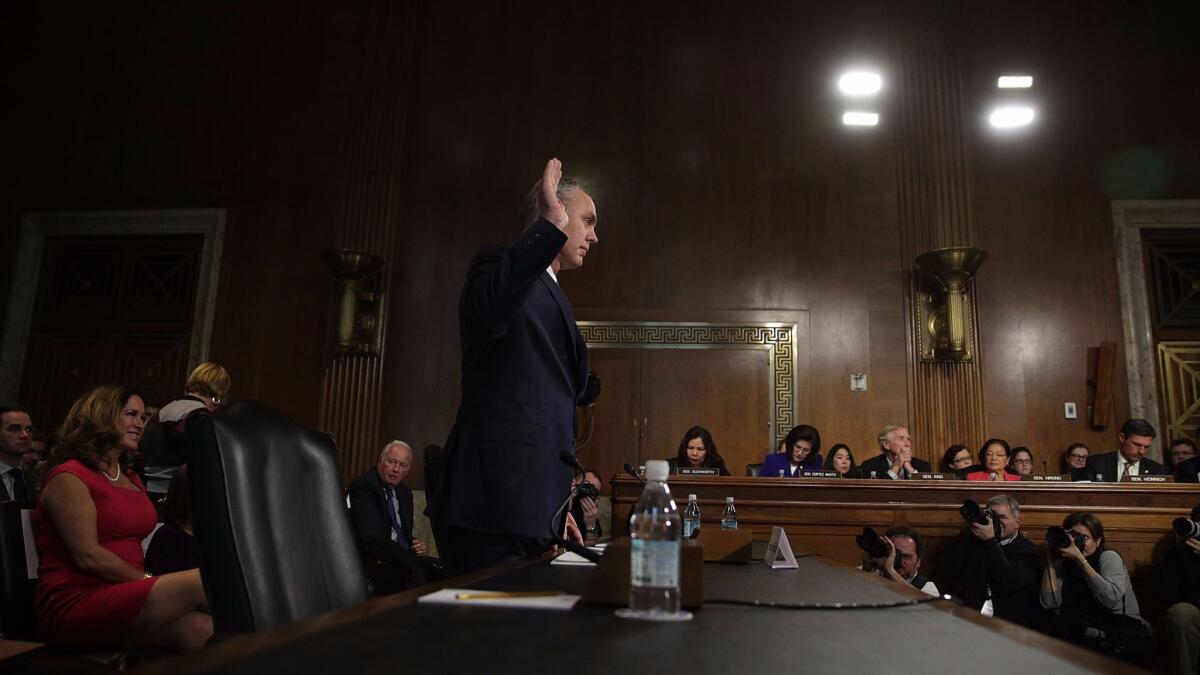Interior secretary nominee Ryan Zinke tells lawmakers he opposes the sale of public land

- Share via
Rep. Ryan Zinke, the Montana Republican nominated by President-elect Donald Trump to be the next Interior secretary, said Tuesday that his “No. 1 job is to restore trust” between Americans and the federal agencies that manage land and water across the West.
Referring to what he called the “top-down” policymaking methods of the Obama administration, Zinke in his confirmation hearing before the Senate Energy and Natural Resources Committee said states should have more say in policies that affect land and water within their boundaries.
He also said he was willing to revisit decisions by the Obama administration, including recent moves to halt coal leasing, ban oil and gas drilling in most of the Arctic and set aside parts of the West as national monuments under the Antiquities Act.
But Zinke also said that he “absolutely” opposed the sale or transfer of public land, and he rejected the idea, which Trump has asserted, that climate change is a hoax. He was less than emphatic in embracing the broad scientific consensus that human activity is the dominant cause of climate change.
Asked by Sen. Bernie Sanders, a member of the committee, whether he agreed with Trump that climate change is a hoax, Zinke began to respond indirectly.
“First of all, the climate is changing, that’s undisputable,” Zinke said, adding that he and his wife had seen evidence of glaciers retreating during a visit to Glacier National Park in Montana.
Sanders cut in, repeating his question: “Is the president-elect right? Is climate change a hoax?”
Zinke asked to finish his initial response.
“The second thing is man has had an influence,” Zinke said. “I think that’s undisputable as well. So, climate is changing, man is an influence. I think where there’s debate on it is what that influence is and what can we do about it.”
Zinke promised to listen to the “great scientists” at the U.S. Geological Survey, which is part of the Interior Department.
“I’m not a climate science expert, but I can tell you I will become a lot more familiar with it and it will be based on objective science,” he said. “I don’t believe it’s a hoax. I believe we should be prudent. That means I don’t know definitively. There’s a lot of debate on both sides of the aisle.”
Sanders interrupted him again, saying, “Well, actually, there’s not a whole lot of debate now. The scientific community is virtually unanimous that climate change is real.”
Climate change has been a central issue at the Interior Department under President Obama, which has sought to limit fossil fuel production on public land, manage forests to be more resilient, urge water conservation and protect vulnerable species.
The department helps oversee the government’s vast holdings of land, most of it in the West, and includes the National Park Service, the Bureau of Indian Affairs and agencies that regulate mining, logging, oil and gas development, hydroelectric power and water management in the often drought-stricken region.
Conservation groups have largely condemned Zinke’s nomination, pointing to his support for fossil fuel development, his efforts to limit the use of the Endangered Species Act and his sometimes contradictory statements on climate change.
Zinke received hundreds of thousands of dollars in campaign contributions from the oil and gas industry. He has also faced questions about his use of government money for personal travel when he was a Navy SEAL, which prompted discipline that slowed his advancement in the Navy.
In the hearing, Sen. Al Franken of Minnesota noted that, in 2010, Zinke, then a Montana state legislator, was among hundreds of state lawmakers who signed a letter to President Obama and congressional leaders saying that climate change was a dangerous threat that needed to be addressed with a new energy policy focused on renewables.
“Do you still feel that climate change is a significant national security threat and one that requires immediate attention?” Franken asked Zinke.
When Zinke demurred, saying he is “not an expert in this field,” Franken, a Democrat, called the answer “a cop out,” adding, “I’m not a doctor, but I have to make healthcare decisions.”
But those were among the few modestly confrontational exchanges Zinke had with the committee, which is dominated by Western lawmakers and led by Sen. Lisa Murkowski, a Republican from Alaska who has been deeply critical of efforts by the Obama administration to limit oil and gas production in the Arctic and other parts of Alaska.
Zinke has cast himself as a “Teddy Roosevelt Republican,” an avid outdoorsman who believes public land should be preserved for multiple uses, including hunting, recreation and energy development. He said on Tuesday that fossil fuel development could be expanded on public land without damaging the environment, but also said he supported wind and solar power. More than once he called his energy policy “all of the above,” borrowing language Obama used regularly before strengthening his fight against climate change at the end of his administration.
He promised to respect tribal sovereignty and look for ways to improve Native American education and healthcare. He also said he would address what he called a $12-billion maintenance backlog in national parks.
Facing few tough questions from the Republican-led panel, he promised to visit many lawmakers’ home states, build “collaborative” relationships and restore confidence in “the front line,” his term for on-the-ground employees of the many agencies. In response to questions about a sexual harassment scandal that has plagued the park service, he said he would have “zero tolerance” for sexual harassment.
Zinke frequently used military terminology to describe how he would approach the job. He said “centralized direction, decentralized execution” would be his preferred way of dealing with states, suggesting they should have leeway in how they implement federal policies.
“I’m going to be remote,” he said at one point, referring to what he said would be frequent travel as he learns the job. “It’s going to be a deployment, but I’ve apologized to my wife in advance.”
More to Read
Sign up for Essential California
The most important California stories and recommendations in your inbox every morning.
You may occasionally receive promotional content from the Los Angeles Times.










